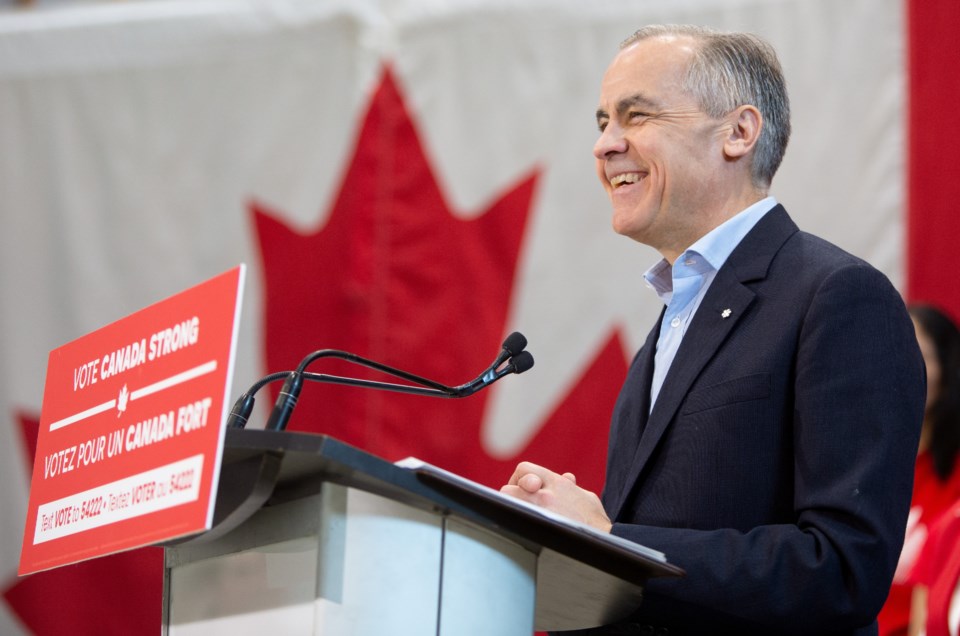Same song, probably a different dance partner.
We went to bed Monday sending Mark Carney into the lion’s den as an elected Liberal prime minister to stare down and subdue Donald Trump. But Canadians gave him anything but the strongest political hand.
Carney will apparently lead a third straight minority government—only now, one in which, of all things, the separatist Bloc Québécois has leverage for Liberal viability. Mathematically, the NDP can return as the support the Liberals need to rule—they’re four short of a majority, and the NDP has seven seats—but it would be folly to bypass the Bloc Quebecois and not bow to a party with 23 seats in a politically important province. Trump must be chuckling, though, at the prospect of contending with a prime minister beholden to a party that wants to leave Canada.
The result was not quite what the latest polls had predicted—a majority Liberal government, not one falling short by single digits. Quebec delivered it the government, but Ontario didn’t deliver its majority. Still, it amounted to an extraordinary reversal of Liberal fortunes, considering Pierre Poilievre’s Conservatives held a two-dozen-point poll lead only a dozen weeks ago, considering also that many thought not so long ago the Liberals might be rendered rubble this election.
What was clear in the result, apart from the remnant considerable division of a tighter-than-expected outcome, was that not even Trump’s threats to sovereignty could make Canadians forgive and forget what the Liberals wrought over three terms, even if under new leadership. Indeed, Poilievre built the party’s base Monday, earning roughly 20 more seats and its largest slice of the vote since 1988. That being said, it was his hesitance at first to denounce Trump—and to call out Trump’s supporters in his own party—that opened a door Carney calmly and luckily walked through.
The fear Trump stoked with every Truth Social post and Oval Office taunt landed clearly with traditional NDP voters, who fled the coop for Carney—if only to ensure it would not be Poilievre across the table from the U.S. president or across the Commons as the prime minister. Its vote collapse was epic; federal politics are, for the time being, a matter of two national parties not three. The NDP will no longer hold official party status in the Commons, and its leader of nearly eight years, Jagmeet Singh, finished third in his Burnaby riding and bade farewell to politics in his concession speech. Carney owes him no small amount of gratitude, and Poilievre erred in making the NDP such a target for so long—he ought to have been keeping them alive to deprive the Liberals of oxygen.
Amid glacial vote-counting late Monday, Poilievre looked like he, too, might lose his seat. Tuesday it was confirmed. It was evident he has no intention of stepping aside as opposition leader, regardless, although he will need to put on the charm offensive to retain his caucus support after such an historic squandering of public support. With no seat in the Commons after seven straight wins in his riding, it’s difficult to see how he makes lemonade out of these lemons. His party has a nasty trait of eating its leaders alive. As with the NDP, the election post-mortem will require Conservatives to rethink. They had the government on the ropes, defined all but one of the election issues, yet could not convince Canadians that the changes they proposed were pressing necessities with an apprehended threat in the wind.
Carney is certainly courageous for taking on the task of taking on the world’s most powerful man. But as he does, he has some domestic healing suddenly on the agenda. He has to deliver on what most winners say on election night—that they’ll endeavour to represent everyone, even adversaries—as he represents the country in its most significant existential moment. The issues he was able to sidestep—affordability, housing, immigration, crime—do not disappear simply because he is at Mar-a-Lago with elbows up.
He will need to renew his party as he seizes control of it from the Trudeau team, set aside some of its tired troops, and multitask as not just a savvy foil to our neighbouring leader but a shrewd enabler of a more prosperous, confident country. He needs to work across the political aisle to apply the force of all parties in the fight ahead with America. It plants a small worry that his campaign lost steam in the home stretch, and that the more Canadians saw of Carney’s pilfering of policy and reticence to be candid about his holdings (or, for that matter, of his conversation with Trump), the less they were enthralled.
"As I’ve been warning for months, America wants our land, our resources, our water, our country,” he said in his late-night acceptance speech. “President Trump is trying to break us so he can own us. That will never happen.”
No one really knows what kind of negotiator, much less what kind of prime minister, we have on our hands. But if he is true to his word—that he will make mistakes, but own them, and that he will lead with humility, as he certainly must have felt Monday in not earning a dominant victory—then perhaps a successful defence of Canada at the bargaining table will prevail as his brand and will carve him quickly into history. Fumble it, though, and the carving will be upon him.
Kirk LaPointe is a Glacier Media columnist with an extensive background in journalism. He is vice-president in the office of the chairman at Fulmer & Co.


